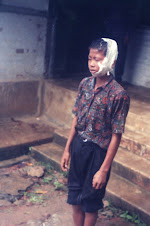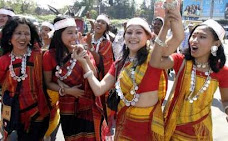Election Commission draws up CHT Voter List:
malafide and malicious to hill peoples interests?
Shikhori Changma
The present caretaker government in Bangladesh took power on 11 January 2007, and soon after, initiated reforms within the Election Commission by appointing new Election Commissioners. More recently, it brought into effect the Electoral Rolls Ordinance, 2007 (Ordinance 18 of 2007). This ordinance enables the Election Commission to register voters for different electoral bodies, to register them with the assistance of computerised databases which will also have their photographs. By `electoral bodies' the Comission means the national Parliament, and local government bodies that are elected, such as Union Parishad, Upazilla Parishad, Zilla Parishad, and Municipal or City Corporation.
According to the new law, the Election Comission will prepare a complete voter list for the 2008 Parliamentary election, and for elections to local government bodies. The army will assist the Commission in this task. The work of registering voters has been concluded in many upazillas and zillas of Bangladesh. The task of registering voters in Bandarban, Rangamati and Khagracchari, the three districts of the Chittagong Hill Tracts, began on 22 October.
Voters in the Hill Tracts have been registered for national elections before, but this registration is different to previous ones, and there is consternation in the air. Differences between previous registration methods and present ones are considerable. The new voter list is a computerised one, the voter list will provide national identity cards, and elections to local bodies (Zilla Parishad, Pourashava, Upazilla, Union Parishad) will be held on the basis of this voter list. Herein lies the reason for consternation and anxiety.
That the Chittagong Hill Tracts is an indivisible part of Bangladesh, is undeniable. Similarly, it is undeniable that the CHT is a special area. The paharis or hill peoples have enjoyed a special status for many hundreds of years. The area has been governed by the Chittagong Hill Tracts Regulation 1900, in addition to other laws prevalent in the country. The Regulation ensured its separate legal status. It was recognised as such during the British colonial period. Its special status continued during the Pakistan period. It did continue after the independence of Bangladesh but for a brief period, only to be totally disregarded later. To defend their existence the hill peoples rebelled; the rebellion soon took the form of an armed strugle. In the name of suppressing the rebellion, the armed forces conducted genocidal operations in the Hill Tracts, killing, maiming and uprooting hills peoples from their ancestral land, raping women, destroying villages, and settling outsider Bengalis on pahari land. On 2 December 1997, after 24 long years, the government of Bangladesh signed an accord with the Parbattya Chattagram Jana Samhati Samiti (PCJSS, or JSS for short). This accord later came to be known as the Peace accord, and although it did not seriously attempt to redress the injustices and wrongs done to the hills peoples, it did reduce the level of systematic violence, and the general lawlessness that had been characteristic of the region for many decades. After the signing of the accord, a Regional Council was formed in the CHT, alongwith three District Councils.
Those eligible to vote in the Regional Council and in the three District Councils, under existing CHT laws, are those who are permanent residents of the Hill Tracts. That only permanent residents can be enlisted as voters, is clearly stated in the Parbatya Zilla Parishad Ain, 1989 (section 17). According to this law, voter eligibility is based on (i) Bangladeshi citizenship (ii) age (must be above 18 years) (iii) mental health, and on being a (iv) permanent resident of Rangamati/ Bandarban/ Khagracchari. The Chittagong Hills Regulation, 1900 (34 (1) rule) defines permanent settlement clearly. A non-tribal person can be considered to be a permanent resident, only if he or she has been a house-owner in CHT for at least 15 years, and in addition does not own a house outside CHT. Or, a non-tribal person can be a permanent resident if he or she has a house, coupled with agricultural land which has been settled on the person by the Deputy Commissioner of CHT, and has no house or agricultural land anywhere else, that is, in any district outside the Hill Tracts.
Since these laws still exist, it is incumbent that Election Commission officials sit with Regional and Zilla Parishad representatives to determine first and foremost the list of permanent residents in the CHT. But instead, the EC has jumped headlong into the task of preparing a voter list. In effect, this means that the Election Commission is preparing a voter list which enrols Bengali settlers as voters, it thereby turns them into permanent residents of the CHT. And in effect, this means that the Election Commission is subverting the laws of land.
Bengalis enter into the Hill Tracts almost every day, even though the CHT enjoys special status. They are also able to settle down, often with the direct or indirect assistance of the government, both civilian and army administrators. This has continued even after the signing of the Peace accord. Recent attempts at rehabilitation sparked off a confrontation between paharis and Bengalis in the Dighinala area of Khagracchari district. A situation of unrest still prevails. Pahari suspicions have been further deepened as EC officials, aided by the army, continue in their task of enrolling voters.
Through preparing voter lists, the government and the army is ensuring that demographic changes in the CHT are made more irreversible than ever before. Further, there are parallel attempts to invalidate the Peace accord. One such instance is a writ petition filed in court by advocate Tajul Islam himself on 27 August 2007. The petition (writ petition no 6451/2007) calls on the Government to give reasons as to why the Peace Accord signed between the government of Bangladesh and the Parbatya Chattagram Jana Sanghati Samiti (PCJSS) should not be considered unconstitutional. The petitioner maintains that the accord violated the provisions of the Constitution, it contravened the sovereignty of Bangladesh and the supremacy of its Constitution. Hence, it should not only be declared illegal, it should not have any legal effect. The Court has simultaneously directed one of the respondents i.e., the Election Commission, to not deprive any non-tribal citizen from being enlisted as a voter during the voter enlistment process, on grounds of beings non-permanent residents of the CHT.
The High Court has issued a rule against the government, and at present the case is pending in the High Court. What is remarkable about the writ petition is that the petitioner has not made the PCJSS (or the Regional Council) a respondent in the case, even though it is a party to the Peace accord. The petitioner hmself does not reside or live in the Chittagong Hill Tracts. As a matter of fact, according to insider sources, the learned advocate has never even visited the CHT. Further, the petition makes no mention of two other writ petitions on the same issue that are at present pending in the High Court. One of these petitions was made soon after the Peace accord (writ petition no 4113/1999), asking that the Peace accord be declared illegal and unconstitutional. The second petition was filed by a Bengali settler, and asks why the Regional Council Law, 1988 and Rangamati/Bandarban, Khagracchari Zilla Parishad Law, 1998 should not be declared unconstitutional. Both these cases are pending. What is of further interest is that though the latest writ petition is of great public interest and concern, the Attorney General who represents the government, made no attempt to put forth a strong rebuttal of the petition.
The hill peoples have fought the Bangladesh army for many decades in the CHT, in order to ensure their survival. These two forces are still suspicious of each other. In this situation, army assistance in preparing voter lists can only serve to exacerbate tensions. It is not far-fetched to assume that many paharis may not even turn up to register as voters. That the government or the EC does not seem to be concerned about these realities, is quite remarkable. Equally remarkable is the fact that neither of the pahari political parties, neither the PCJSS nor the UPDF (United Peoples Democratic Front) which have represented and fought for pahari interests have either been consulted, or made a party to the government's voter registration process. This has only served to deepen pahari fears and anxieties that the mechanism and process of voter registration in the CHT is malicious in intent.
An Election Commissioner had recently commented that the new "voter list will be a source of pride for the nation and its peoples" (Prothom Alo, 26.10.2007).
It might well be so for the rest of Bangladesh, but surely not for the paharis.
skip to main |
skip to sidebar

Military enforcement

Survive

Torture

Raped & Killed Indigenous Jumma Women

Militarization in CHTs

Religious destruction

Land Grabbing

Indigenous Jumma Villeges burnt down

Atrocities


CHTs is a number one of Millitary Zone in the World.

With Traditional Dress
nandawansa

Military enforcement

Survive

Torture

Raped & Killed Indigenous Jumma Women

Militarization in CHTs

Religious destruction

Land Grabbing

Indigenous Jumma Villeges burnt down

Atrocities
Embassy in Los Angeles
About Bangladesh
Refugee in Homeland

News Papers
Audio & Video
Actrocities & Tortures

CHTs is a number one of Millitary Zone in the World.
Jumma Photo Albums
Jumma Links
Jumma Women

With Traditional Dress
Blog Archive
About Me
- IJPNUSA
- The Indigenous Jumma People Net in North America is for the movement of minority Jumma indigenous people in Chittagong Hill Tracts in Bangladesh. E-mail:jpnus@yahoo.com Webpage:-http://jummapeoplenet.blogspot.com/
